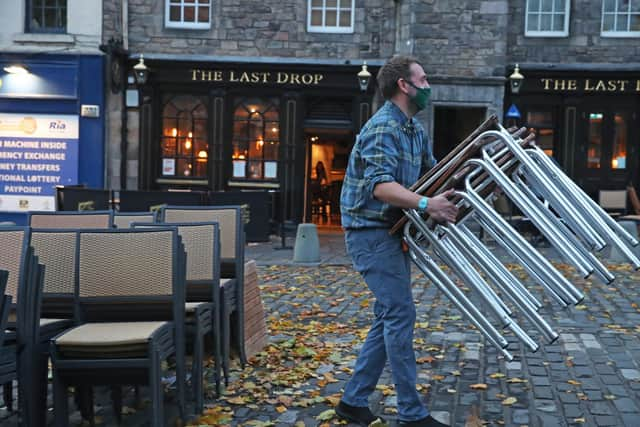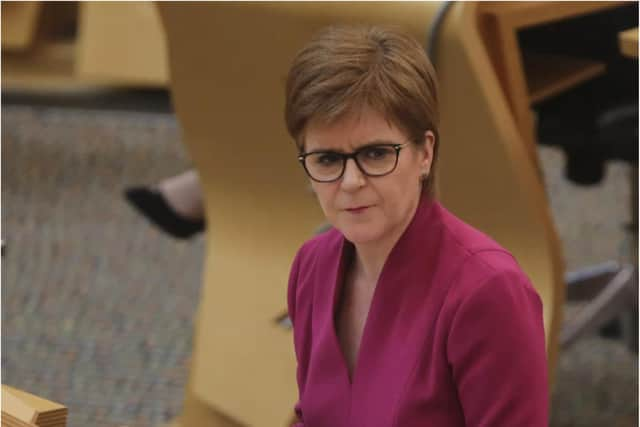Scottish coronavirus tier system will cause 'wave of trauma and mental anguish', warns Scottish tourism chief
Speaking after the Scottish Parliament tonight voted though a government motion on the new system, the Scottish Tourism Alliance warned businesses in areas placed under the toughest restrictions in level three or four could even have to shut permanently.
The warning came despite a wider relaxing of restrictions on pubs and restaurants, with many to be subject to more generous opening hours and the ability to sell alcohol indoors from Monday as part of changes to the levels system for lockdown restrictions.


Advertisement
Hide AdAdvertisement
Hide AdHospitality businesses in the Central Belt – the equivalent of level three, according to the First Minister – are currently forced to shut completely if they are considered a pub or a restaurant, while cafes are allowed to operate between 6am and 6pm with no alcohol sales allowed.
These rules will ease from Monday, with Central Belt pubs and restaurants to be allowed to open to serve food at level three.
It means the Scottish government will ditch their controversial definition of ‘cafe’, which led to confusion and criticism from opposition parties.
The Scottish Government has also pledged to bring in a postcode checker, so people can be sure what restrictions are in place in their local authority area.


Much of central Scotland, including Edinburgh and Glasgow, as well as Dundee, is expected to be placed straight into level three when the tiers are introduced.
Both North and South Lanarkshire could be in level four, Ms Sturgeon indicated, although she said this would only happen if “absolutely necessary”.
Despite the easing of hospitality restrictions, Marc Crothall, chief executive of the Scottish Tourism Alliance, said the system would “without a shadow of a doubt create a wave of trauma and mental anguish across the sector".
He said “many hundreds of businesses who will fall into tier three or four” were now “likely to stay closed beyond Christmas, or indeed permanently” – with this leaving their staff at risk of unemployment.
Advertisement
Hide AdAdvertisement
Hide AdCalling for more help for the sector, he said: “The gap between the funding that is available and the costs of overheads and maintaining staff levels has become too great, and I would expect imminent announcements of redundancies on a worrying scale, particularly for any businesses placed in tier three or four.
"Without a robust package of support, our hospitality and tourism sectors are facing the bleakest of winters with very little hope of recovery beyond the beginning of 2021.
"The current and predicted impact on the mental health of those within our sector is now becoming one of the biggest issues and challenges we are all facing as we look to the weeks ahead, as is the economic impact on our communities.”
From Monday, hospitality venues in level two areas – expected to include Fife and the Scottish Borders – will be allowed to serve alcohol with a main meal between 6am and 8pm.
Level three will see all pubs, restaurants, bars and cafes allowed to open between 6am and 6pm for food sales and non-alcoholic drinks.
Such premises in level four would be closed, along with non-essential stores, visitor attractions, gyms, libraries and hairdressers.
Ms Sturgeon outlined her ambition for all of Scotland to get to level one - and then level zero - "as quickly as it is possible to do".
The First Minister said: "We know it is possible because over the summer we got to the very low levels of transmission that would be needed for that.
Advertisement
Hide AdAdvertisement
Hide Ad"If we can do that once we can do it again, but it will not be easy."
The Highlands Council area, as well as Orkney, Shetland, the Western Isles and Moray, could all go straight into level one - the second lowest tier - in the new plan, Ms Sturgeon indicated.
And while being in level one could allow people to meet in other's homes again - six people from two households are permitted to meet indoors in such areas - the First Minister said the restriction on indoor gatherings would remain in place "for a period as an extra precaution" as Scotland transitions to the new system.
She urged Scots to "dig in", saying this could allow people to enjoy some more normality over the festive period.
Ms Sturgeon said: "It is difficult and frustrating, and getting moreso by the day, especially as we head towards Christmas."If we dig in now and get Covid under more control, we perhaps open the door not to 100 per cent normality by Christmas, but hopefully more than we have right now. We all want to see that."
The vote to note the Covid strategic framework, a formality given the Scottish government’s plans to introduce the system from Monday, passed after the Scottish government accepted the Scottish Green and Scottish Liberal Democrat amendments calling for more testing and additional data to be published.
Approval from MSPs came as the Scottish Conservatives called for more specific planning to be done for Christmas and for more consultation with businesses affected by the new restrictions.
Tories Holyrood leader Ruth Davidson called on the Scottish government to give more detail on arrangements for Christmas and welcomed the government’s plan to work with the other four nations to develop a plan for students to return home for the holiday.
Advertisement
Hide AdAdvertisement
Hide AdCalling for limited household socialisation across the first four tiers at Christmas, Ms Davidson said such a move would limit loneliness and isolation, and improve compliance to the restrictions.
"It is impossible for every seat normally taken at the family table to be filled this Christmas, but nobody should have to sit alone,” she said.
A message from the Editor:Thank you for reading this article. We're more reliant on your support than ever as the shift in consumer habits brought about by Coronavirus impacts our advertisers.
If you haven't already, please consider supporting our trusted, fact-checked journalism by taking out a digital subscription.
Comments
Want to join the conversation? Please or to comment on this article.